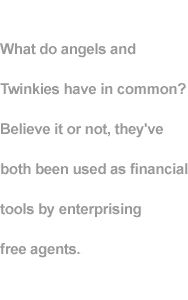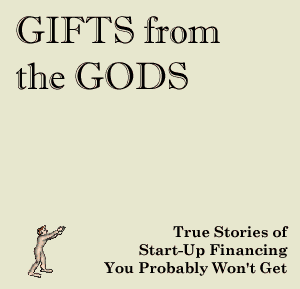 |
|
||||||||||||
 |
|
||||||||||||

|

|
|
By Ken Gordon
|
Whether you borrow from a frowning father-in-law, refinance the house, or sponge off a wage-slave spouse, funding your own company usually involves some unhappy combination of pride-swallowing and belt-tightening. In fact, you may have such awful start-up memories, or such active fundraising-phobia, that you're about to click out of this article -- but don't touch that mouse! Starting up doesn't have to hurt. Below are the stories of two IPs whose methods may change your mind about gathering seed money. Ten Grand Twinkies Chris Smith is a distinguished young filmmaker. His latest film, American Movie, which is just about to be released nationwide, won this year's Grand Jury Prize for Documentaries at the Sundance Film Festival. But his main distinction, as far as our story goes, is the way he financed his first feature, American Job, a film about low-end wage slavery. How did he do it? One word: Twinkies. About five years ago, Chris was hardly the full-time auteur he is today. "I was working a minimum-wage job at a camera store," he says. He also worked as second assistant cameraman on a country-and-western TV show called The Road. "I was in the back loading and unloading cameras," he recalls, without a hint of complaint or regret in his voice. Meanwhile, American Job was moving along nicely. He had shot the film during his off-hours for about $7,000 (which, in the great tradition of independent filmmakers, he begged, borrowed, and stole). But midway through production, Chris saw that he needed more cash to finish. Enter Twinkies, stage left. It so happened that that year saw the 65th Anniversary of the Twinkie, and the birth of something called The Golden Twinkie Film Awards. The GTFA was a contest that challenged young filmmakers across the country to produce a short piece about America's favorite cream-filled, chemically fortified, tawny little sponge cake. The winners would get a $5,000 grant to make the film and a $5,000 cash prize. If Chris won the contest, he could use the money to finish American Job. The idea had a faint Brady Bunch or even, yes, Twinkie aftertaste, but that didn't stop Chris. Chris submitted a script for the "animated short" category. The script was supposed to be a tribute to Twinkies, but, as Chris explains, "It didn't really pay tribute to anything." He called it The Escape. Set in a Twinkie Factory in Twinkie Village, the plot involved a Quality Control Twinkie with cowboy hat and eyes, two Twinkie pals, a grocery store, a nighttime janitor, and, of course, a big escape. The director says that The Escape shares American Job's "alienated nature," though the Twinkie piece is more "lighthearted on the surface." Chris entered. Chris won. Chris collected $10,000. He spent as little Twinkie Money as possible on the animated short, and as much as he could on his real film project, American Job. In the end, Chris finished his Job for just $14,000. And while much of the film owed its life to the Twinkie dough, it had a big debt much closer to home. American Job's incredibly low production costs were possible because Chris' friends, many of whom saw a rough cut of the film, were so impressed that they worked for nothing. On his Web site, Chris nobly salutes all the people who "donated their time to make this portrait of what it's really like to work in low-end America." With friends like that, who needs subcontractors? |
||||
| |||||
|
November 4, 1999 Primary Editors: Lawrence San, Eric Gershon Illustrators: Keith Gendel, Lawrence San, and Michael Buonarroti Production: Keith Gendel |
We'd love to hear your comments about this article! Ken Gordon is Associate Editor of 1099. | ||||
| |||||